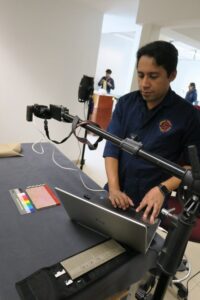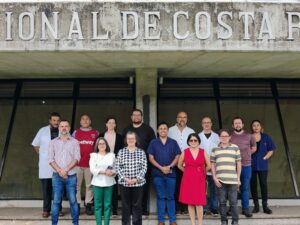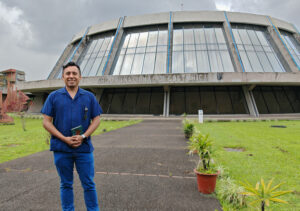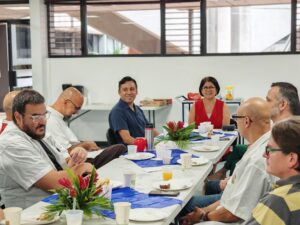As of 1 October 2024, the National Archives of Costa Rica will have a new professional in its Conservation Department. He is Daniel Cuautli Estrada García, from Mexico, who will exchange professional experiences with his colleagues until 29 November. Estrada is the first beneficiary of the Iberarchivos Scholarship for professional exchanges.
As part of the start of his work in Costa Rica, Daniel was welcomed at the institution by authorities and managers, as well as an induction tour of the facilities. In addition, he participated in a working tour of the Atlantic zone where two travelling exhibitions were installed as part of the institution’s goals in the National Development Plan. He is now fully incorporated into the work dynamics of the Conservation Department.
The National Archive of Costa Rica is a decentralised entity of the Ministry of Culture and Youth (MCJ). It was created in 1881 and today serves the nation with three fundamental tasks: to protect and facilitate the documentary heritage, to help control the exercise of the notarial profession in Costa Rica and to be the governing body of the National Archives System (composed of the archives of the country’s public institutions).
In April, the Iberarchivos Programme launched a call for applications for scholarships aimed at Ibero-American professionals in the archival sector, on a competitive basis. This scholarship, focused on the conservation of archives, will be carried out in the National Archives of Costa Rica during the months of October and November 2024, and has the financial support of the Spanish Agency for International Development Cooperation(AECID).
In the words of Cristina Díaz, technical secretary of Iberarchivos:
“The professional exchange grants of the Iberarchivos programme, which we are launching this year in its first edition, are essential to strengthen the capacities of archives professionals in Ibero-America, a region with strong historical, cultural and archival ties. Through these exchanges, the transfer of knowledge, best practices and experiences between countries is encouraged, promoting cooperation and the development of specialised skills. This contributes not only to the preservation of the region’s documentary heritage, but also to the modernisation and efficiency of archival management, which in turn benefits society by facilitating access to information and the safeguarding of shared memory.
The National Archives of Costa Rica is honoured to be part of this experience. This was explained by Carmen Campos Ramírez, its director general:
“For the National Archives of Costa Rica it is an honour to have been selected as the first institution to participate in this Iberarchivos Professional Exchange Programme, on this occasion dedicated to documentary conservation. We assume this designation with great enthusiasm and commitment, and for this reason we have prepared a comprehensive work programme with Mr. Daniel Estrada García, a professional from Mexico. Documentary conservation is essential in archives, including national archives, in order to maintain the documentary heritage in good condition, defining preventive and corrective conservation plans adopted to ensure the physical and functional integrity of the documents. In this titanic task, more challenging every day, we will count on the support and professional judgement of Mr. Estrada, whom we thank for being part of our work team during these two months, and I am sure that we will maintain these bonds of mutual collaboration in the future”.
A new colleague in the National Archives
Daniel Cuautli Estrada, was selected among more than 20 candidates from 8 different Ibero-American countries: Peru, Argentina, Colombia, Chile, Philippines, Cuba, Ecuador and Mexico.
Daniel, originally from Mexico, has seven years of experience in the archives sector. His career includes the coordination of the Conservation Workshop at the Historical Archive of the Archdiocese of Yucatán (2017-2022) and projects at the General Archive of the Nation. With a background in History from the National Autonomous University of Mexico (UNAM) and certifications in conservation, her interest in the fellowship lies in broadening her knowledge and strengthening links with professionals and institutions in the archival sector.
He currently works as a documentary and bibliographic restoration technician attached to the Centro de Conservación, Restauración y Encuadernación del Apoyo al Desarrollo de Archivos y Bibliotecas de México(ADABI), a civil association that for 21 years has had the objective of rescuing, organising and conserving Mexico’s documentary and bibliographic heritage.
For Daniel Cuatli Estrada, this space represents an “opportunity to get to know the colleagues as well as the working methods they use in the National Archive of Costa Rica. In addition, I am very pleased and important for the links and synergies that will emerge during my stay”. He explained that his expectations include, “in addition to sharing knowledge and skills, to know the niches of opportunity in conservation issues, and to form and strengthen the links between my work institution, ADABI of Mexico, and the National Archives of Costa Rica and Iberarchivos”.
How did Daniel’s interest in conservation and restoration come about? He explains it by means of an anecdote: “It came about because I was concerned about not knowing the structure of a book that a friend asked me to re-bind. This led me to take a diploma course with ADABI de México and begin my life in archives, starting in the Historical Archive of the Archdiocese of Yucatán, the General Archive of the Nation, Mexico, and currently for ADABI de México. At the same time, I have kept myself in constant training with courses and diplomas from the Escuela Nacional de Conservación, Restauración y Museografía, and the Archivo Histórico de la UNAM”.
Preserving Costa Rican documentary heritage
The Conservation Department of the National Archive is responsible for preserving the documents held by the institution that have a high value for science and culture. In order to fulfil this task, it provides restoration, binding and reprographic services. It also provides advice and training in documentary conservation to the people in charge of the archives that form part of the National Archive System (SNA).
Amongst its specific tasks, it is possible to highlight the carrying out of periodic diagnoses of the state of conservation of the National Archive’s documentary collections. This information is used to establish priorities in the care of documents. It also reproduces documents in alternative formats, as a security measure and to preserve the originals. Finally, among other tasks, it is a Department that is part of the process of mounting documentary exhibitions and the Travelling Exhibitions Programme of the National Archive, which in 2023 alone allowed more than 20,000 people from all over the country to have a closer look at the documentary heritage through an exhibition.
The Conservation Department employs 13 people (currently 14, with the presence of Daniel) who work in the areas of restoration, binding and reprography. Ivannia Valverde Guevara, Deputy Director General of the National Archive, is in charge of the department.





